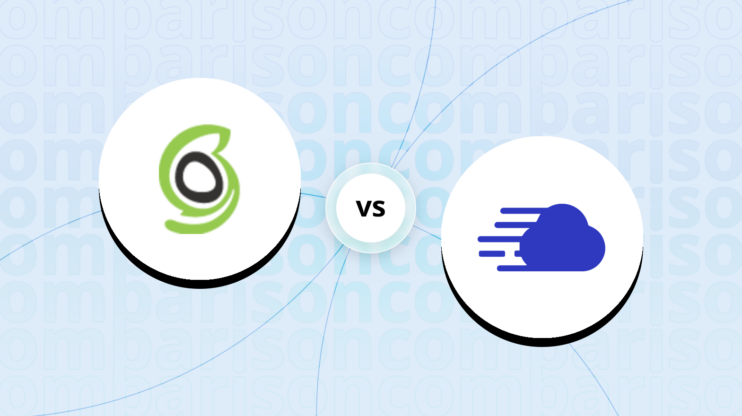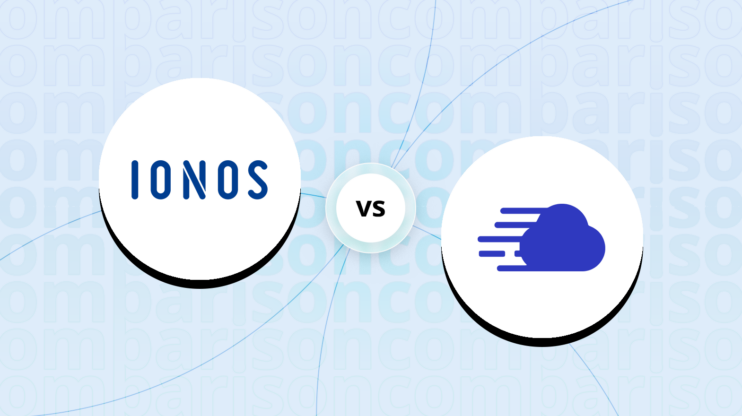Godaddy vs Domain.com: Final verdict
Looking over GoDaddy vs. Domain.com, it’s clear why both hosts are so popular. They have both hosted millions of
websites that run on WordPress for decades, building up a loyal customer base.
-
Domain.com (Overall grade: 6.5)
provides reliable hosting plans with a straightforward approach and is particularly beneficial for high-traffic websites due to its dedicated hosting solutions. It excels in offering straightforward and user-friendly management, ideal for budget-conscious users and newcomers with its drag-and-drop builder. However, Domain.com falls short in actual uptime performance and lacks advanced scalability options compared to GoDaddy. Additionally, its slower response times and minimal detail on specific security and technical features make it a less favorable choice overall.
GoDaddy (Overall grade: 7.8)
offers a comprehensive array of hosting options including shared, WordPress, VPS, and ecommerce hosting, with a commendable uptime guarantee of 99.9%. It’s particularly suitable for users with multimedia websites and those needing scalable options like VPS hosting, while boasting faster server response times and extensive global data centers. Despite its strengths, GoDaddy’s WordPress hosting could have occasional downtimes offset by available compensation and a strong suite of performance-enhancing features like unmetered bandwidth and NVMe SSDs.
 Overall grade:7.8 |
 Overall grade:6.5 |
|
|---|---|---|
| Uptime and Availability | 8.6 | 3.2 |
| Hosting Performance | 8.1 | 5.3 |
| Hosting Security | 8.6 | 7.9 |
| Price | 7.7 | 8.1 |
| Hosting Features | 7.1 | 5.8 |
| Ease Of Setup | 8.7 | 7.7 |
| User Management | 5.0 | 7.2 |
| Customer Support | 8.2 | 7.1 |
| User feedback | 3.9/5 | 3.2/5 |
Hosting types offered
Both platforms provide a variety of hosting types, each designed to meet the different needs of users.
 |
 |
|
|---|---|---|
| Shared hosting | ||
| Cloud hosting | ||
| WordPress hosting | ||
| Ecommerce hosting | ||
| VPS hosting | ||
| Dedicated hosting |
Although both offer a variety of hosting plans tailored to different needs, in
certain cases, one platform may prove to be more suitable.
Detailed comparison
Uptime and availability
Evaluates the average uptime statistics, uptime guarantee and overall availability of the hosting
provider
Score Components:
- Uptime percentage (30%): evaluates the uptime statistics in given period of time
- Uptime guarantee (20%): Assesses if the platform offers an uptime guarantee and
whether the actual uptime matches the promised guarantee. - General performance (25%): Evaluates how fast is the average response time and overall
it’s stability. - Responsiveness (10%): Adaptability to different devices and screen sizes.
- Availability (25%): Reflects the total downtime and number of outages.
 8.6
8.6
 3.2
3.2
🏆 Winner GoDaddy: A short one-sentence description
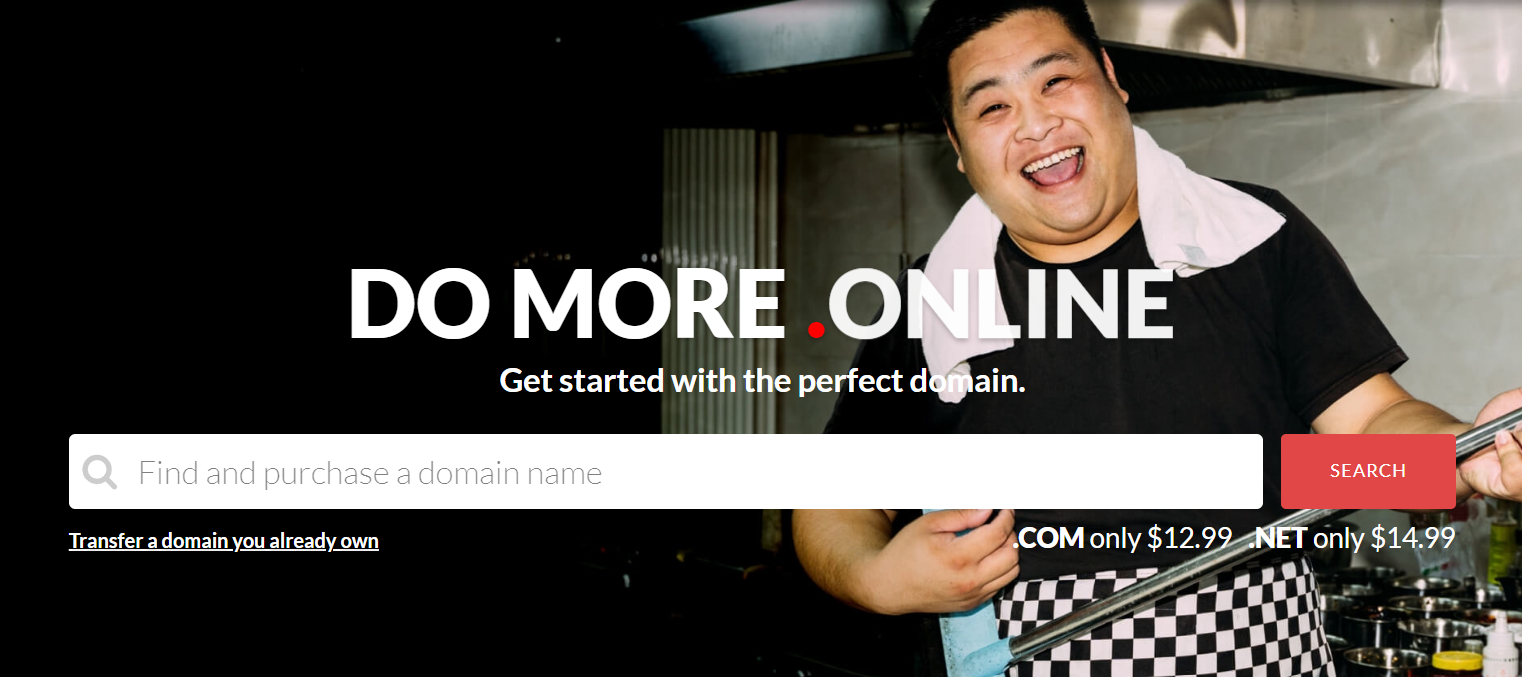
GoDaddy offers a 99.9% uptime guarantee and delivers strong reliability with a 99.98% uptime rate during testing. Its server response time averages at 341ms, outperforming the 600ms shared hosting average. Despite these impressive metrics, GoDaddy’s WordPress hosting plans have frequent short downtimes, though compensation is available as a 5% monthly fee credit.

Domain.com claims a 99.99% uptime guarantee but falls short in actual performance, achieving only 99.11% uptime over two weeks. Its response times are considerably slower, averaging 2.97 seconds and becoming more unreliable under load. The vague downtime policy and poor performance metrics make Domain.com less favorable compared to GoDaddy.
Which one has better hosting performance?
Score Components:
- Hosting speed (30%): This includes SSD quality, Load times, PageSpeed score ranges,
additional information on website speed, built-in plugins for performance enhancement, available caching
methods, and CPU/RAM options - CDN (20%): Considers whether CDN is available or not, whether it’s free or paid, and
the quality of the CDN service - Available data centers (30%): Evaluates the number of data centers and their locations
globally. - Scalibility (20%): Looks at whether elastic scaling is available, the process required
to scale (manual upgrade vs. automatic scaling), the presence of dedicated servers, and the costs
associated with scaling.
 8.1
8.1
 5.3
5.3
🏆 Winner GoDaddy: GoDaddy offers optimized servers with up to 40% faster response times, global data centers in North America, Europe, and Asia-Pacific, and a 99.9% uptime guarantee, which ensures minimal downtime. Domain.com provides unlimited bandwidth, a 99% uptime guarantee, and reliable speed; however, it lacks detailed information about its SSD quality and CDN options. GoDaddy offers unmetered bandwidth, shared and dedicated resources, and a comprehensive suite of features, which contribute to its higher performance rating.
GoDaddy offers up to 40% faster server response times and utilizes NVMe SSDs in its hosting packages, enhancing load times and overall website performance. With global data centers and DDoS protection, sites hosted on GoDaddy can expect high-speed delivery and reduced latency. Domain.com, while offering a 99% uptime guarantee, doesn’t provide specific details on SSD quality or specialized speed plugins, making it difficult to gauge how it matches up against GoDaddy’s clearly defined performance metrics.
Website Speed
GoDaddy offers up to 40% faster server response times and utilizes NVMe SSDs in its hosting packages, enhancing load times and overall website performance. With global data centers and DDoS protection, sites hosted on GoDaddy can expect high-speed delivery and reduced latency. Domain.com, while offering a 99% uptime guarantee, doesn’t provide specific details on SSD quality or specialized speed plugins, making it difficult to gauge how it matches up against GoDaddy’s clearly defined performance metrics.
Scalability
GoDaddy provides flexible options for site scalability, including Web Hosting Plus plans with dedicated resources and VPS hosting with KVM virtualization. These allow for manual control and resource upgrades as needed without automatic scaling. Costs range from $5.99/mo to $129.99/mo depending on the package and term. Domain.com emphasizes shared hosting and has limited information on dedicated servers or automatic scaling options, making it less clear on how it handles growth for larger sites.
Which one has better security features?
and regulatory requirements
Score Components:
- Technical security measures (40%): This includes encryption, firewalls, DDoS
protection, secure configurations, server monitoring, access control and availability of security addons
(e.g Sitelock security). - Operational security measures (30%): Encompasses data privacy, backups and data
redundancy. - Compliance and certifications (20%): Adherence to legal and regulatory requirements
(e.g., GDPR, HIPAA) and possession of certifications (e.g., ISO 27001, SOC 2). - Business and reliability (10%): Factors in the provider’s reputation, uptime
guarantees, and customer support.
 8.6
8.6
 7.9
7.9
🏆 Winner
GoDaddy: GoDaddy offers a robust suite of security features, an advanced hosting environment, and consistent compliance with regulatory standards.
Both GoDaddy and Domain.com, have notable differences in their approaches to technical and operational
security, as well as in their compliance with regulations.
Technical security measures:
GoDaddy and Domain.com offer comprehensive security features with some differences. GoDaddy provides a variety of SSL certificates, including AutoSSL that auto-renews, Managed SSL Service, and Self-Managed SSL Certificates. Domain.com also offers multiple SSL certificates with varying warranties. For malware protection, both providers include features such as scanning and removal, but GoDaddy adds additional elements like a Web Application Firewall (WAF) and daily backups. GoDaddy’s PHP support includes the latest versions with extended long-term support, which is not explicitly detailed by Domain.com.
Operational security measures:
Both GoDaddy and Domain.com offer robust operational security measures. GoDaddy includes daily automatic backups with one-click restore, 24/7 DDoS protection, and resources on-demand features. It also provides around-the-clock customer support via phone and chat including SMS. Domain.com provides similar 24/7 support with security experts available. However, GoDaddy’s operational security stands out due to additional features like CloudLinux for balanced resource limits and Cage FS for virtualized file system protection.
Compliance and certifications:
Both hosting providers comply with GDPR, ensuring data protection for EU residents. They allow users to manage data requests and consent effectively. GoDaddy is PCI compliant and offers PCI-certified products, similar to Domain.com. However, neither provider specifies compliance with HIPAA.
 |
 |
|
|---|---|---|
SSL certificate |
AutoSSL, Managed SSL, Self-Managed SSL |
DV, OV, E-commerce, Wildcard |
Additional security features |
WAF, daily backups, DDoS protection, on-demand resources |
SiteLock Security, Domain Privacy |
PHP versions |
Latest PHP 7.4, 8.0 |
Not specified |
GDPR compliance |
Yes |
Yes |
HIPAA compliance |
Not specified |
Not specified |
PCI compliance |
Yes |
Yes |
Hosting features
Score Components:
- Domains (20%): Assesses the availability of a free domain, domain purchase options, and
pricing - Email (15%): Considers if the provider offers full email hosting, or is reselling
third-party service, and if the email is only transactional or not - Website builder (15%): Checks if website builder is available, and it’s user
friendliness and overall the level of customization allowed. - Staging environment (20%): Determines if a staging environment is available, allowing
for testing changes before going live. - FTP & SFTP accounts (10%): Evaluates if and how easily users can access FTP and
SFTP accounts - Git and SSH access (20%): Assess whether Git is integrated into the hosting service and
if SSH access is provided
 7.1
7.1
 5.8
5.8
🏆 Winner
GoDaddy: A full-featured hosting service with robust performance and additional managed services.
GoDaddy and Domain.com offer comprehensive hosting solutions tailored to different customer needs. GoDaddy stands out with its versatile web hosting plans covering a range of capabilities from Standard to Maximum Performance. Each level includes essential services such as a free domain name, free email, SSL certificates, and automated backups. GoDaddy is particularly advantageous for users looking for managed WordPress hosting, offering features like AI creation tools, enhanced security with DDoS protection, and a staging environment for testing changes. The free WordPress migration tool simplifies the transition, making it attractive for WordPress users.
Domain.com provides a more straightforward approach with its offering of unlimited bandwidth, storage, and FTP accounts. The drag-and-drop site builder makes it user-friendly for beginners, although it doesn’t specify the availability of more advanced environments like staging. Their free domain for the first year with a promo code and the inclusion of SSL certificates match some of GoDaddy’s offers but don’t extend beyond the first year. While Domain.com’s lack of specific SSH availability might be limiting for developers requiring more control, its shared and dedicated hosting plans are beneficial for both small businesses and large enterprises seeking scalable solutions.
 |
 |
|
|---|---|---|
Free Domain |
Yes |
Yes, for the first year |
Free SSL |
Yes |
Yes, for the first year |
Email Hosting |
Yes |
Not specified |
Website Builder |
Yes, with AI tool |
Yes, drag-and-drop |
Staging Environment |
Yes |
Not specified |
FTP & SFTP Accounts |
Yes, includes SSH |
Yes |
Git and SSH Access |
Yes |
No |
Free Backup |
Yes |
No |
Money Back Guarantee |
Yes, 30-day |
Not specified |
a location.
As a result in rare cases the features mentioned here can differ from the ones you see on their websites.
Both providers support a range of users from beginners to experts with user-friendly website builders and WordPress staging areas. However, in terms of developer tools, both GoDaddy and Domain.com offer robust options including SSH access, support for multiple programming languages, and Git for version control, thus appealing to developers looking for advanced capabilities.
Email Services:
Email services at GoDaddy are provided through a partnership with Microsoft 365, offering a professional email and access to Outlook on a trial basis before transitioning to a paid service. Conversely, Domain.com provides unlimited free professional email accounts, which is particularly beneficial for users requiring multiple email accounts without incurring additional costs.
Price
Score Components:
- Plan value (40%): What each pricing tier offers.
- Transparency and clarity (30%): Clearness of pricing structures.
- Flexibility of plans (20%): Range of options to suit different budgets.
- Hidden costs (10%): Additional expenses not included in the plan.
 7.7
7.7
 8.1
8.1
🏆 Winner
Domain.com: With competitive pricing and comprehensive features, Domain.com emerges as the leading hosting provider in this comparison.
Evaluating the pricing of plans among various hosting providers can be complex due to their differing pricing and renewal strategies. Additionally, certain plans require annual commitments, which adds to the difficulty of making comparisons. The prices listed are based on monthly commitments; plans requiring annual commitments are indicated. Additionally, although some providers offer identical plans for WordPress and shared hosting, we have created separate tables for each to enhance clarity.
Comparing the pricing plans of GoDaddy and Domain.com highlights key differences. GoDaddy offers a more diverse range of hosting plans, including shared, WordPress, and VPS hosting with varying features and prices, focusing on free domain names, SSL certificates, and considerable storage options. On the other hand, Domain.com provides consistently priced plans across shared and WordPress hosting categories, making it easier to budget, with thoughtful features such as a drag-and-drop builder and efficient SSL certificates. Domain.com also offers unlimited bandwidth on more affordable plans, making it a valuable choice for budget-conscious users.
 |
 |
|---|---|
|
Managed WordPress Basic $12.99/mo:
1 website, 10 GB NVMe storage, Free Domain, Free SSL Certificate, WordPress pre-installed, AI creation tool, Weekly backups, Web Application Firewall, Automated malware scans & removal. Value for price:7.5
|
Basic Plan $3.75/mo:
1 website, 10GB web storage, 15k visitors, unmetered bandwidth, 5 FTP accounts, Free Domain for the first year (with DOMFREE coupon), Free SSL for the first year. Value for price:8.0
|
|
Managed WordPress Deluxe $13.99/mo:
1 website, 20 GB NVMe storage, Free Domain, Free SSL Certificate, WordPress pre-installed, AI creation tool, Daily backups, Web Application Firewall, Automated malware scans & removal, Up to 2x faster performance with CDN, Enhanced security with DDoS protection, Staging site. Value for price:7.8
|
Plus Plan $3.75/mo:
5 websites, 20GB web storage, 50k visitors, unmetered bandwidth, 10 FTP accounts, Free Domain for the first year (with DOMFREE coupon), SSL Certificate included. Value for price:8.5
|
|
Managed WordPress Ultimate $15.99/mo:
1 website, 30 GB NVMe storage, Free Domain, Free SSL Certificate, WordPress pre-installed, AI creation tool, Daily + on-demand backups, Web Application Firewall, Automated malware scans & removal, Up to 2x faster performance with CDN, Enhanced security with DDoS protection, Staging site, SEO Optimizer, WordPress code optimizer, Smart WordPress plugin manager, Sell online with WooCommerce, Priority Support. Value for price:8.0
|
Premium Plan $3.75/mo:
10 websites, 40GB web storage, 200K visitors, unmetered bandwidth, 15 FTP accounts, Free Domain for the first year (with DOMFREE coupon), SSL Certificate included. Value for price:8.8
|
 |
 |
|---|---|
|
Web Hosting Economy $5.99/mo:
1 website, 25 GB NVMe storage, 10 databases, Shared RAM and vCPU resources, Free domain, Free email, Free SSL Certificate, 30-day money-back guarantee. Value for price:7.0
|
Basic Plan $3.75/mo:
1 website, 10GB web storage, 15k visitors, unmetered bandwidth, 25 FTP accounts, Drag-and-drop builder, Free domain for the first year (with DOMFREE coupon), Free SSL for the first year. Value for price:8.0
|
|
Web Hosting Deluxe $7.99/mo:
10 websites, 50 GB NVMe storage, 25 databases, Shared RAM and vCPU resources, Free domain, Free email, Free, unlimited SSL for all websites, 30-day money-back guarantee. Value for price:7.5
|
Plus Plan $3.75/mo:
5 websites, 20GB web storage, 50K visitors, unmetered bandwidth, 50 FTP accounts, Drag-and-drop builder, Free domain for the first year (with DOMFREE coupon), SSL Certificate included. Value for price:8.5
|
|
Web Hosting Ultimate $12.99/mo:
25 websites, 75 GB NVMe storage, 50 databases, Shared RAM and vCPU resources, Free domain, Free email, Free, unlimited SSL for all websites, 30-day money-back guarantee. Value for price:8.0
|
Premium Plan $3.75/mo:
10 websites, 40GB web storage, 200K visitors, unlimited bandwidth, Unlimited FTP accounts, Drag-and-drop builder, Free domain for the first year (with DOMFREE coupon), SSL Certificate included. Value for price:8.8
|
|
Web Hosting Maximum $17.99/mo:
50 websites, 100 GB NVMe storage, 100 databases, Shared RAM and vCPU resources, Free domain, Free email, Free, unlimited SSL for all websites, 30-day money-back guarantee. Value for price:8.5
|
N/A
N/A
|
 |
 |
|---|---|
|
1 vCPU / 2GB RAM $8.99/mo:
1 vCPU core, 2 GB RAM, 40 GB NVMe SSD Storage, Snapshot backups, Linux only, cPanel or Plesk available, 1 additional IP available upon request, Global data centers. Value for price:7.8
|
N/A
N/A
|
|
2 vCPU / 4GB RAM $17.99/mo:
2 vCPU cores, 4 GB RAM, 100 GB NVMe SSD Storage, Snapshot backups, Linux and Windows compatible, cPanel or Plesk available, 2 additional IPs available upon request, Global data centers. Value for price:8.0
|
N/A
N/A
|
|
4 vCPU / 8GB RAM $34.99/mo:
4 vCPU cores, 8 GB RAM, 200 GB NVMe SSD Storage, Snapshot backups, Linux and Windows compatible, cPanel or Plesk available, 3 additional IPs available upon request, Global data centers. Value for price:8.5
|
N/A
N/A
|
|
4 vCPU / 16GB RAM $44.99/mo:
4 vCPU cores, 16 GB RAM, 200 GB NVMe SSD Storage, Snapshot backups, Linux and Windows compatible, cPanel or Plesk available, 3 additional IPs available upon request, Global data centers. Value for price:8.8
|
N/A
N/A
|
Enterprise plans
For enterprises, GoDaddy’s hosting plans for managed WooCommerce stores offer varying levels of service with features such as unlimited products and AWS hosting. The plans are robust, providing support for high-volume sales and advanced security features. Domain.com’s shared and WordPress hosting plans, although less tailored for enterprise needs, can still be advantageous for growing businesses with their affordable pricing and comprehensive storage and bandwidth allowances.
Godaddy vs Domain.com: Ease of setup
platform.
Score Components:
- Site migration (25%): Assesses whether the provider offers tools for site migration,
either automated or manual, and whether these services are free or require a fee. - Admin panel usability (35%): Evaluates the type of admin panel provided, such as the
standard cPanel or a custom solution, focusing on its accessibility and user-friendliness for both
technical and non-technical users. - Setup features (20%): Examines the availability and ease of use of various setup
features, including FTP accounts, file managers, email account setup, PHPMyAdmin, and easy CDN
configuration. - Help center quality (20%): Measures the quality and accessibility of the provider’s
help center resources, including articles and tutorials.
 8.7
8.7
 7.7
7.7
🏆 Winner GoDaddy:GoDaddy offers a simpler and more user-friendly setup experience for both novices and experts.
GoDaddy’s admin panel is industry-standard cPanel, known for its ease of use. This panel simplifies tasks such as app installation, managing backups, and security configurations. It caters to both technical and non-technical users, making it accessible to a broad audience. The clear layout and straightforward navigation ensure that even those with limited technical knowledge can manage their websites effectively. Daily automatic backups also add a layer of convenience, helping users easily recover from potential issues.
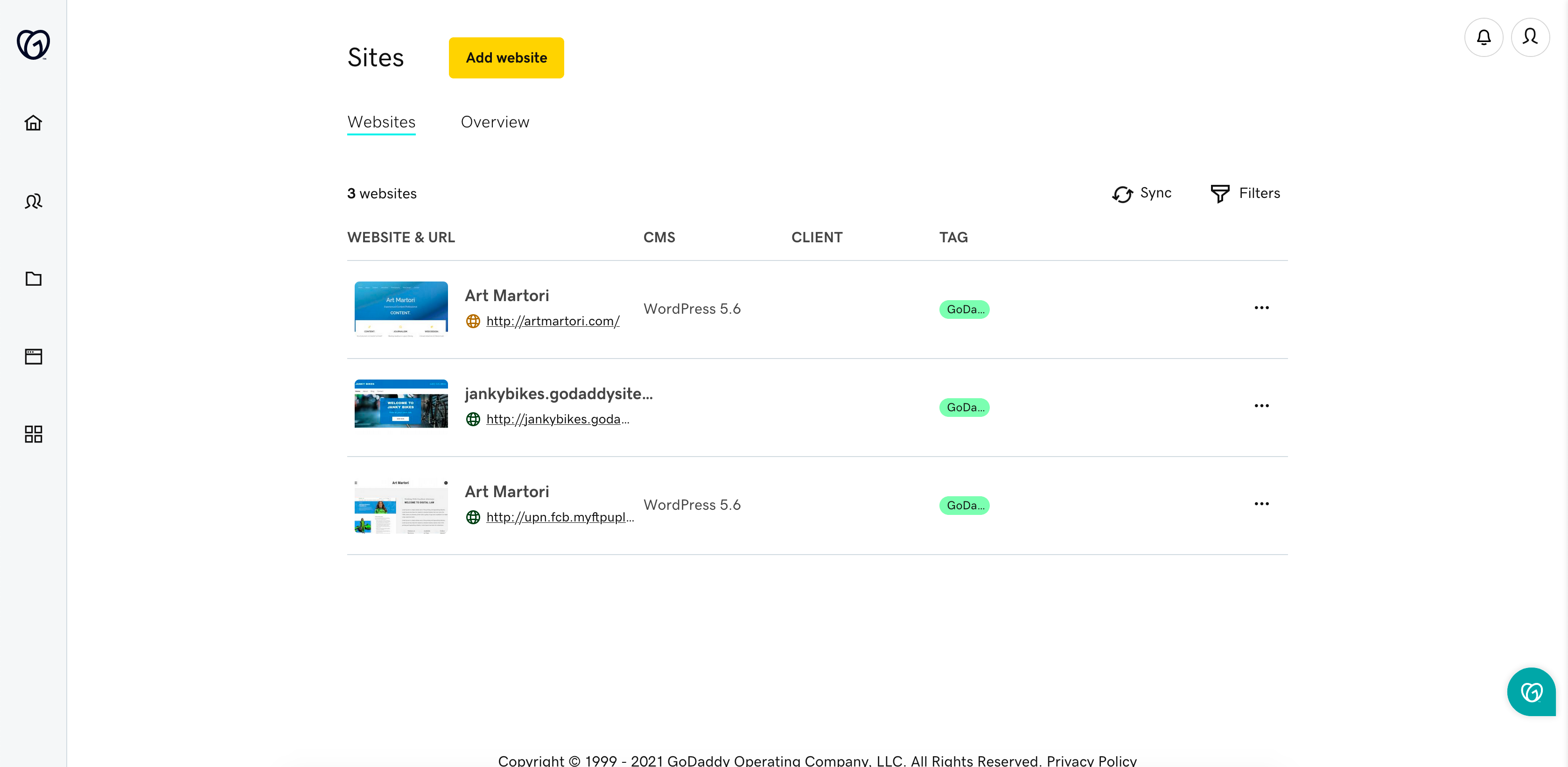
Domain.com, on the other hand, provides a customized control panel, specifically tailored for its hosting environment. This control panel integrates various functionalities, such as Google Workspace, to streamline access to business email and productivity tools. While the customized control panel might offer a cohesive experience, it requires some familiarization. The drag-and-drop website builder and AI-powered site creation are significant advantages for non-technical users, who may find it easier to build and manage their sites without needing to understand deeper technical aspects.
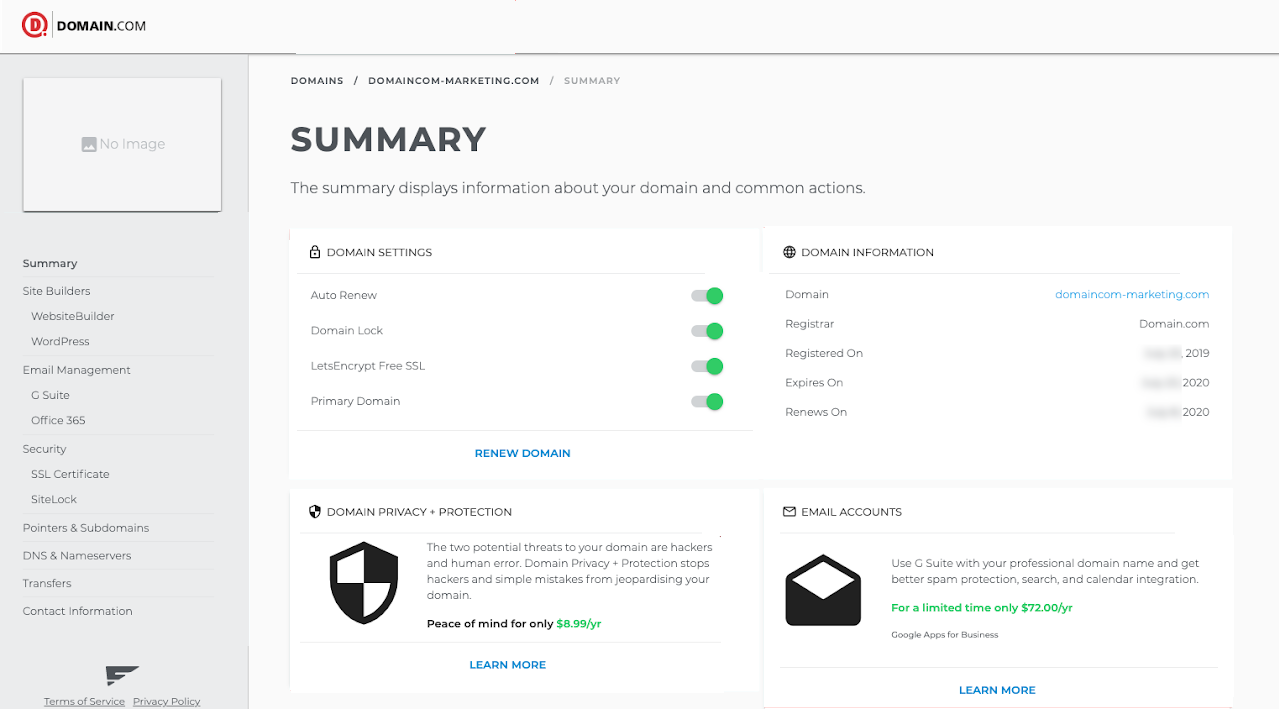
Both GoDaddy and Domain.com offer migration services for websites, but their approaches and costs differ. GoDaddy provides a free WordPress migration tool, allowing users to easily transfer their existing WordPress sites to its hosting platform. This feature is highly beneficial for those migrating from other services or starting anew with minimal hassle. Domain.com provides WordPress hosting as well, though the specific details around the ease and cost of their migration services are less clear. The convenience and clarity of GoDaddy’s free migration tool stand out in this comparison.
The help center resources of both providers are quite comprehensive and accessible. GoDaddy offers 24/7 support via phone, chat, and SMS, alongside a plethora of help articles and an extensive FAQ section. Their support page and dedicated guides ensure that users can find answers quickly. Domain.com provides similar resources, including a 24/7 live chat, a thorough knowledge base, and a blog with useful articles on various hosting-related topics. Both platforms have invested heavily in customer support, making it easy for users to get the help they need.
User management
accessibility.
Score Components:
- Role customization (40%): Flexibility in creating and defining user roles and
permissions. - Ease of management (30%): User interface and tools for managing users.
- Access control (20%): Effectiveness of access control measures for different user
levels. - Scalability (10%): Ability to manage a growing number of users efficiently.
 5.0
5.0
 7.2
7.2
🏆 Winner Domain.com: Domain.com demonstrates superior flexibility and accessibility in user management features.
Comparing GoDaddy and Domain.com on user management, Domain.com clearly outlines a diverse set of defined roles within its WordPress offerings: Administrator, Editor, Author, Contributor, and Subscriber. These roles provide a clear framework for user permissions, making it straightforward to assign and manage access levels. In contrast, GoDaddy lacks specific information about such detailed user roles and permissions in the given context. This ambiguity can make it harder for users to understand and manage roles effectively.
When it comes to user interface and tools for managing users, Domain.com offers an intuitive dashboard within WordPress, facilitating easy navigation through the “Users” section where new users can be added, roles assigned, and user activity monitored. The step-by-step process for adding users underlines the platform’s user-friendly approach. GoDaddy’s user management interface details are not specified, potentially requiring additional efforts to locate and understand the corresponding functionalities, which could affect ease of use.
Considering access control measures and the capability to handle a growing number of users, Domain.com is well-equipped with predefined roles that can scale according to the website’s needs. The structured approach helps in efficiently managing permissions and ensuring users have appropriate access without compromising security. Without specific information on GoDaddy’s access control capabilities, it is difficult to gauge its effectiveness in offering tailored and scalable solutions for user management, potentially limiting its usability for larger sites.
Domain.com user roles table:
| Role | Description | Access highlights |
|---|---|---|
| Administrator | Full access to all administrative functions of the WordPress site. | Can perform all tasks including site settings and plugin management. |
| Editor | Manages, edits, and publishes all posts. | Can edit and publish posts made by other users, focusing on content management. |
| Author | Writes and publishes own posts. | Can upload files and manage their own posts, without affecting others’ content. |
| Contributor | Writes and edits own posts. | Cannot publish or delete posts, requires higher role approval to publish their content. |
| Subscriber | Reads posts and updates their profile. | Limited to managing personal profile and reading published content. |
Customer support
hosting provider.
Score Components:
- Support communication channels (30%): Measures the variety of customer support types
provided (live chat, chatbot, email, phone, etc.) - Availability (20%): Assesses the availability hours for each channel, including 24/7
support options. - Technical support quality (30%): Assesses whether the provider offers comprehensive
technical support, including hardware upgrades (e.g., HDD to SSD), software installations, and web
server configuration changes. - Enterprise support (20%): Checks if there are dedicated or priority support services
for enterprise-level customers.
 8.2
8.2
 7.1
7.1
🏆 Winner GoDaddy: Offering comprehensive 24/7 support via phone, email, knowledgebase, and SMS.
 |
 |
|
|---|---|---|
Phone support |
||
Live chat support |
||
Chatbot |
||
Email/ticket support |
||
Enterprise support (dedicated agent, priority support) |
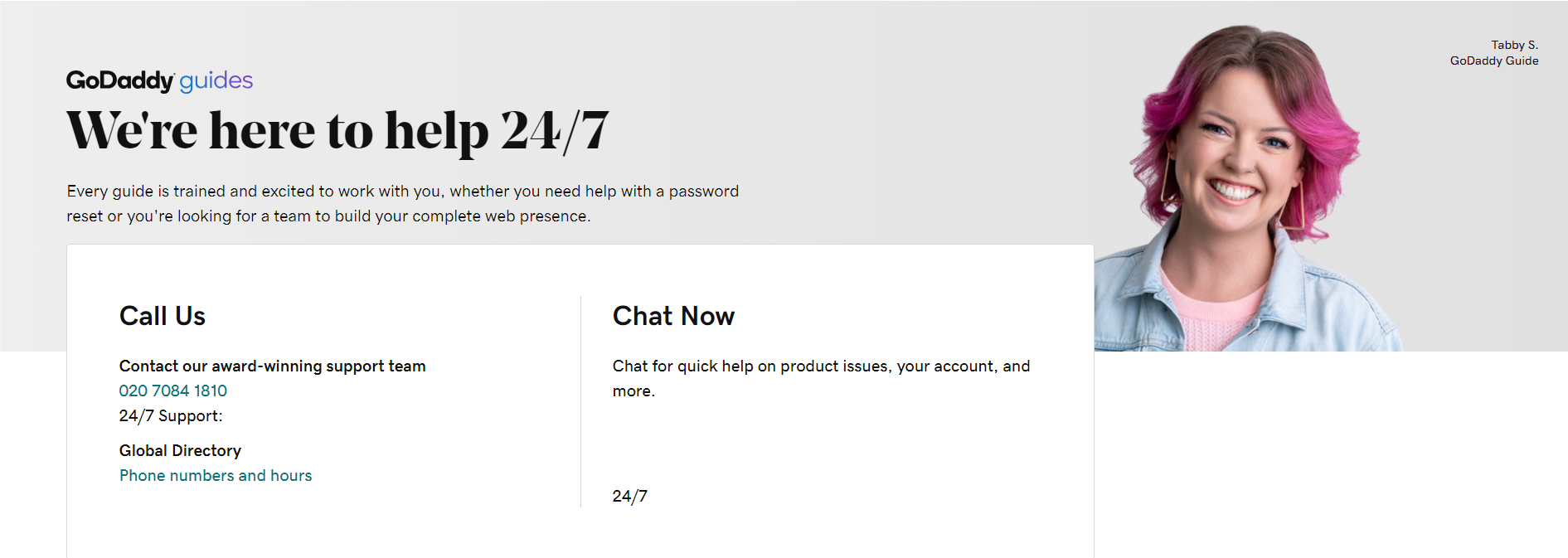
GoDaddy and Domain.com both provide 24/7 customer service via phone and live chat. GoDaddy offers a broader range of contact methods, including email and SMS support, whereas Domain.com does not explicitly mention email support. While both have accessible phone support, GoDaddy features an award-winning phone support team and multiple helplines for different issues, potentially giving it a slight edge.
Regarding additional support options, GoDaddy’s extensive knowledgebase is more comprehensive, including blog articles, guides, online courses, and a large user community. Domain.com, although providing a simpler knowledge base with video tutorials and articles, lacks the multiple channels GoDaddy supports. Furthermore, GoDaddy includes extra features like automatic daily backups and a WordPress migration tool, enhancing the overall user experience.
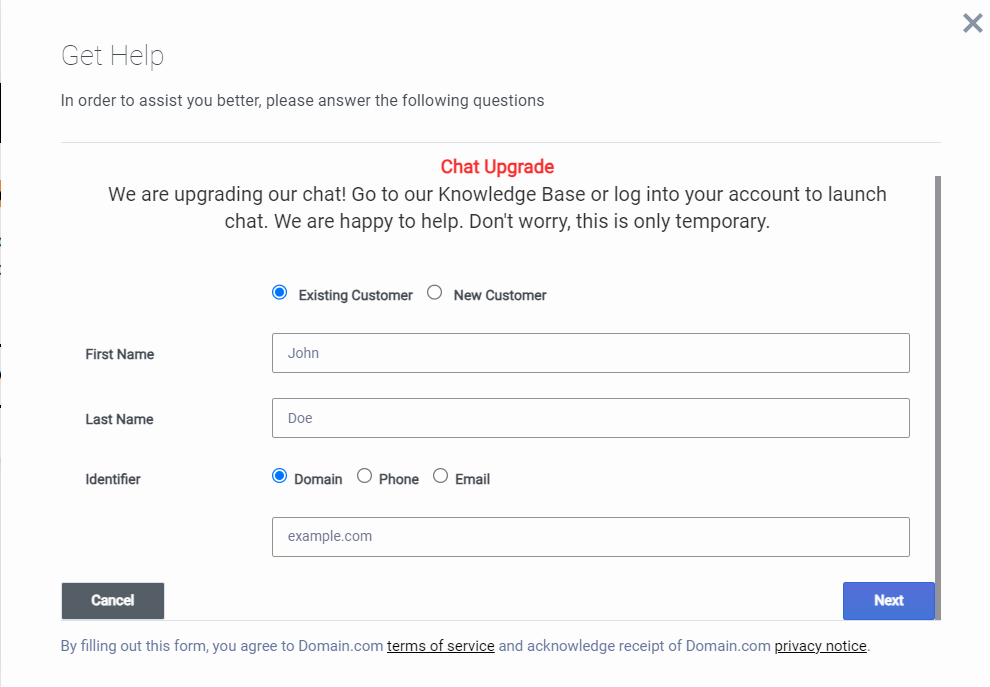
Godaddy vs Domain.com: User feedback
GoDaddy generally receives praise for its ease of use, affordability, comprehensive service offerings, and user-friendly interface, making it a popular choice for domain registration and basic web hosting. Many users appreciate the ability to purchase domains, web hosting, email services, and other digital products all in one place, along with frequent discounts for new customers. However, customer service experiences are inconsistent; while some users find it helpful and responsive, others report long wait times and unknowledgeable support staff. Additionally, recurring issues include high renewal costs, persistent upselling, and occasional technical difficulties.
User feedback for this hosting provider reveals a mixed experience. Many users appreciate its user-friendly platform, straightforward domain registration process, and reliable customer support. However, significant criticisms include poor customer service practices, confusing pricing and add-ons, and outdated or slow web interfaces. While some users praise the affordability and efficiency of domain management, others warn of hidden costs and problematic service.
Godaddy vs Domain.com: FAQ
Which platform is better suited for hosting WordPress websites?
Both GoDaddy and Domain.com offer optimized WordPress hosting solutions with pre-installed plugins and customized control panels. GoDaddy stands out with features like AI creation tools, enhanced security with DDoS protection, and a staging environment. However, both platforms are effectively tied in this category, making either a viable option for WordPress hosting.
Which hosting service offers better security features?
GoDaddy provides a more comprehensive suite of security measures, including various SSL certificates, a Web Application Firewall (WAF), daily backups, DDoS protection, and extended PHP support. Domain.com offers similar options with multiple SSL certificates and SiteLock Security but lacks some of the advanced security features that GoDaddy provides.
What are the major differences in pricing and value between GoDaddy and Domain.com?
GoDaddy offers a more diverse range of hosting plans with different features and prices, including shared, WordPress, and VPS hosting. Domain.com provides consistently priced plans across shared and WordPress hosting categories, making budgeting easier with features like unlimited bandwidth and a drag-and-drop builder. Overall, Domain.com is more budget-friendly, while GoDaddy offers a higher value-for-price ratio with a broader range of features.
Which hosting service offers more scalability options for growing websites?
GoDaddy provides flexible options for scalability, including Web Hosting Plus plans with dedicated resources and VPS hosting with KVM virtualization. These options allow for manual control and resource upgrades as needed. Domain.com emphasizes shared hosting and has limited information on dedicated servers or automatic scaling, making GoDaddy clearly the better choice for scalable solutions.
What are the differences in the control panels offered by each hosting service?
GoDaddy’s admin panel is the industry-standard cPanel, which is known for its ease of use and straightforward navigation, suitable for both technical and non-technical users. Domain.com offers a customized control panel tailored for its hosting environment, which integrates various functionalities like Google Workspace but may require some familiarization. GoDaddy’s clear layout and ease of use give it an edge over Domain.com’s custom panel.
The making of this blog
We followed a clear, step-by-step process to write and research this article.









